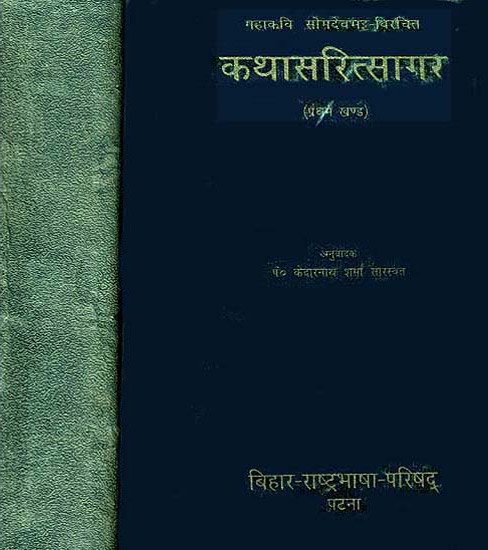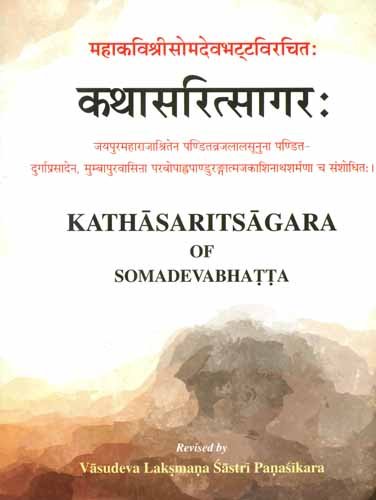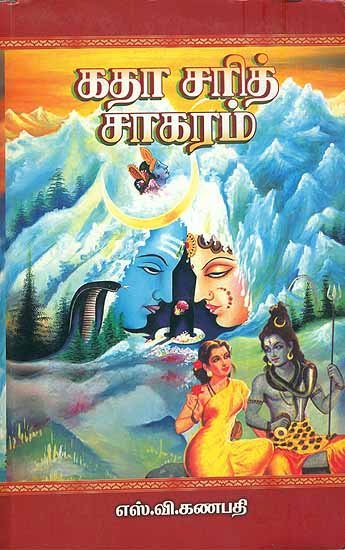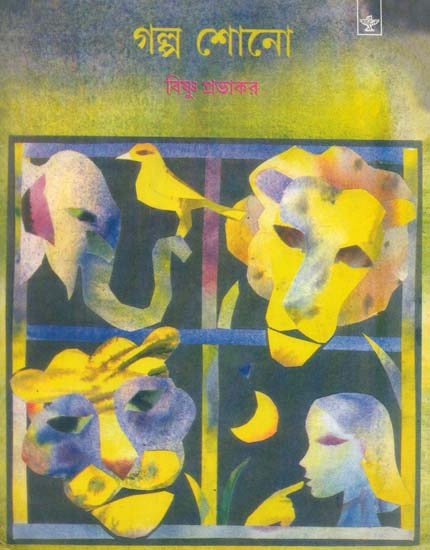Kathasaritsagara [sanskrit]
by C. H. Tawney | 2014 | 226,424 words | ISBN-13: 9789350501351
The Sanskrit edition of the Kathasaritsagara referencing the English translation and grammatical analysis. Written by Somadeva and dating from the 12th century, the Kathasaritsagara (or Katha-sarit-sagara) represents an epic legend narrating the adventures of Naravahanadatta as he strives to become the destined emperor of the Vidyadharas. Alternative titles: (Kathāsaritsāgara, कथासरित्सागर, Kathā-sarit-sāgara)
Verse 9.2.407
सानन्दो मदनप्रभः स च ततः सा चाप्य् अनङ्गप्रभा दिव्यान्योन्यवपुर्विलोकनलसद्गाढानुरागावुभौ ।
स श्रीमान्समरश् च खेचरपतिः सर्वे समुत्पत्य खं जग्मुर्वीरपुरं सहैव किल ते वैद्याधरं तत्पुरम् ॥ ४०६ ॥
sānando madanaprabhaḥ sa ca tataḥ sā cāpy anaṅgaprabhā divyānyonyavapurvilokanalasadgāḍhānurāgāvubhau |
sa śrīmānsamaraś ca khecarapatiḥ sarve samutpatya khaṃ jagmurvīrapuraṃ sahaiva kila te vaidyādharaṃ tatpuram || 406 ||
The English translation of Kathasaritsagara Verse 9.2.407 is contained in the book The Ocean of Story by C.H. Tawney. This book is available online or you could buy the latest edition:
Read online Buy now! The English translation by C.H. Tawney (2014)
Glossary of Sanskrit terms
Note: This extracts Sanskrit terms and links to English definitions from the glossary, based on an experimental segmentation of verse (9.2.407). Some terms could be superfluous while some might not be mentioned. Click on the word to show English definitions.
Sananda, Madanaprabha, Tatah, Tad, Tata, Anangaprabha, Divya, Yoni, Yonin, Yonya, Avapus, Vilokana, Lasat, Gadha, Ura, Aga, Agu, Ubha, Shrimat, Samara, Khecara, Pati, Sarva, Samud, Patya, Kham, Kha, Virapura, Saha, Sah, Kila, Yushmad, Vaidyadhara, Tat, Pur, Pura,
Analysis of Sanskrit grammar
Note: this is an experimental feature and only shows the first possible analysis of the Sanskrit text (Kathasaritsagara Verse 9.2.407). If the system was successful in segmenting the sentence, you will see of which words it is made up of, generally consisting of Nouns, Pronouns, Verbs, Participles and Indeclinables. Click on the link to show all possible derivations of the word.
- Line 1: “sānando madanaprabhaḥ sa ca tataḥ sā cāpy anaṅgaprabhā divyānyonyavapurvilokanalasadgāḍhānurāgāvubhau ”
- sānando* -
-
sānanda (noun, masculine)[nominative single]
- madanaprabhaḥ -
-
madanaprabha (noun, masculine)[nominative single]
- sa -
-
sa (noun, neuter)[compound], [vocative single]sa (noun, masculine)[nominative single]
- ca -
-
ca (indeclinable conjunction)[indeclinable conjunction]ca (noun, masculine)[compound], [vocative single]ca (noun, neuter)[compound], [vocative single]
- tataḥ -
-
tataḥ (indeclinable adverb)[indeclinable adverb]tataḥ (indeclinable correlative)[indeclinable correlative]tataḥ (indeclinable)[indeclinable]tad (noun, neuter)[ablative single], [ablative dual], [ablative plural]tata (noun, masculine)[nominative single]√tan -> tata (participle, masculine)[nominative single from √tan class 8 verb]sa (noun, masculine)[ablative single], [ablative dual], [ablative plural]sā (noun, feminine)[ablative single], [ablative dual], [ablative plural]
- sā -
-
sā (indeclinable correlative)[indeclinable correlative]sā (noun, feminine)[nominative single]
- Cannot analyse cāpy*an
- anaṅgaprabhā* -
-
anaṅgaprabhā (noun, feminine)[nominative plural], [vocative plural], [accusative plural]
- divyān -
-
divya (noun, masculine)[accusative plural]
- yonya -
-
yonī (noun, feminine)[compound], [adverb], [nominative single], [vocative single]yonin (noun, masculine)[compound], [adverb], [nominative single]yonin (noun, neuter)[compound], [adverb], [nominative single], [vocative single], [accusative single]yonya (noun, masculine)[compound], [vocative single]yonya (noun, neuter)[compound], [vocative single]
- avapur -
-
avapus (noun, masculine)[compound], [adverb], [nominative single], [vocative single]avapus (noun, neuter)[compound], [adverb], [nominative single], [vocative single], [accusative single]
- vilokana -
-
vilokana (noun, neuter)[compound], [vocative single]
- lasad -
-
√las -> lasat (participle, neuter)[nominative single from √las class 1 verb], [vocative single from √las class 1 verb], [accusative single from √las class 1 verb]
- gāḍhān -
-
gāḍha (noun, masculine)[accusative plural]
- urā -
-
uras (noun, masculine)[compound]uras (noun, neuter)[compound]urā (noun, feminine)[nominative single]
- agāvu -
-
aga (noun, masculine)[nominative dual], [vocative dual], [accusative dual]agu (noun, masculine)[locative single]agu (noun, feminine)[locative single]
- ubhau -
-
ubha (noun, masculine)[nominative dual], [vocative dual], [accusative dual]
- Line 2: “sa śrīmānsamaraś ca khecarapatiḥ sarve samutpatya khaṃ jagmurvīrapuraṃ sahaiva kila te vaidyādharaṃ tatpuram ”
- sa -
-
sa (noun, neuter)[compound], [vocative single]sa (noun, masculine)[nominative single]
- śrīmān -
-
śrīmat (noun, masculine)[nominative single]
- samaraś -
-
samara (noun, masculine)[nominative single]
- ca -
-
ca (indeclinable conjunction)[indeclinable conjunction]ca (noun, masculine)[compound], [vocative single]ca (noun, neuter)[compound], [vocative single]
- khecara -
-
khecara (noun, masculine)[compound], [vocative single]khecara (noun, neuter)[compound], [vocative single]
- patiḥ -
-
pati (noun, feminine)[nominative single]pati (noun, masculine)[nominative single]
- sarve -
-
sarva (noun, masculine)[nominative plural], [locative single]sarva (noun, neuter)[nominative dual], [vocative dual], [accusative dual], [locative single]sarvā (noun, feminine)[nominative dual], [vocative single], [vocative dual], [accusative dual]
- samut -
-
samud (noun, masculine)[compound], [adverb], [nominative single], [vocative single]samud (noun, neuter)[compound], [adverb], [nominative single], [vocative single], [accusative single]
- patya -
-
patya (noun, neuter)[compound], [vocative single]√pat -> patya (absolutive)[absolutive from √pat]√pat -> patya (absolutive)[absolutive from √pat]√pat (verb class 4)[imperative active second single]
- kham -
-
kham (indeclinable)[indeclinable]kha (noun, masculine)[adverb], [accusative single]kha (noun, neuter)[adverb], [nominative single], [accusative single]khā (noun, feminine)[adverb]
- jagmur -
-
√gam (verb class 1)[perfect active third plural]√gam (verb class 2)[perfect active third plural]√gam (verb class 3)[perfect active third plural]
- vīrapuram -
-
vīrapura (noun, neuter)[adverb], [nominative single], [accusative single]
- sahai -
-
saha (indeclinable postposition)[indeclinable postposition]saha (noun, masculine)[compound], [vocative single]saha (noun, neuter)[compound], [vocative single]sahā (noun, feminine)[nominative single]sah (noun, masculine)[instrumental single]sah (noun, neuter)[instrumental single]√sah (verb class 1)[imperative active second single], [imperative middle first single]
- aiva -
-
√i (verb class 2)[imperfect active first dual]
- kila -
-
kila (indeclinable particle)[indeclinable particle]kila (noun, masculine)[compound], [vocative single]√kil (verb class 6)[imperative active second single]
- te -
-
ta (noun, masculine)[locative single]ta (noun, neuter)[nominative dual], [vocative dual], [accusative dual], [locative single]tā (noun, feminine)[nominative dual], [vocative single], [vocative dual], [accusative dual]tad (noun, neuter)[nominative dual], [accusative dual]sa (noun, masculine)[nominative plural]sā (noun, feminine)[nominative dual], [accusative dual]yuṣmad (pronoun, none)[dative single], [genitive single]
- vaidyādharam -
-
vaidyādhara (noun, masculine)[adverb], [accusative single]vaidyādhara (noun, neuter)[adverb], [nominative single], [accusative single]
- tat -
-
tat (indeclinable correlative)[indeclinable correlative]tad (noun, neuter)[compound], [nominative single], [accusative single]
- puram -
-
pura (noun, masculine)[adverb], [accusative single]pura (noun, neuter)[adverb], [nominative single], [accusative single]purā (noun, feminine)[adverb]pur (noun, feminine)[accusative single]
Other editions:
Also see the following editions of the Sanskrit text or (alternative) English translations of the Kathasaritsagara Verse 9.2.407
Kathasaritsagar
by Kedarnath Sharma Saraswat (2005)
The Only Edition with the Sanskrit Text and its Hindi Translation (An Old and Rare Book) Set of 3 Vol.
Buy now!
Kathasaritsagara of Somadeva Bhatta (Sanskrit Text Only)
by Vasudeva Laksmana Sastri (2013)
Katha Sarit Sagar in Marathi
by H. A Bhave (1995)
Set of 5 Volumes; Published by Varada Books, Pune. 2256 pages (Throughout B/W Illustrations).
Buy now!
Katha Sarit Sagara (Tamil)
by S. V. Ganapati (எஸ். வி. கணபதி) (2014)
[கதா சரித் சாகரம்] Published by Alliance Publications.
Buy now!
Galpa Shono
by Abhijit Chattopadhyay (2014)
[গল্প শোনো] Galpa Shono: Bengali Translation of 'Suno Kahani From Katha Sarit Sagar'; 9788126015436; Published by Sahitya Akademi, Delhi.
Buy now!Preview of verse 9.2.407 in Bengali sript:
সানন্দো মদনপ্রভঃ স চ ততঃ সা চাপ্য্ অনঙ্গপ্রভা দিব্যান্যোন্যবপুর্বিলোকনলসদ্গাঢানুরাগাবুভৌ ।
স শ্রীমান্সমরশ্ চ খেচরপতিঃ সর্বে সমুত্পত্য খং জগ্মুর্বীরপুরং সহৈব কিল তে বৈদ্যাধরং তত্পুরম্ ॥ ৪০৬ ॥
![Kathasaritsagara [sanskrit] - book cover](/uploads/a/Katha-Sarit-Sagara.jpg)




